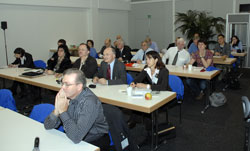 The IFAJ professional improvement session is now underway here at Green Week. These panelists will each be making remarks before things open up for a general discussion. The topic is, “How journalists can work more effectively with public relations professionals and vice versa.” The panelists include:
The IFAJ professional improvement session is now underway here at Green Week. These panelists will each be making remarks before things open up for a general discussion. The topic is, “How journalists can work more effectively with public relations professionals and vice versa.” The panelists include:
Adrian Bell, Director, Pharo Communications on behalf of Merial
Orla McAleer, Corporate Communications Manager, Alltech
Dr. Oliver Neumann, Manager, Public Relations, John Deere
Ralf Stephan, Chief Editor, Bauernzeitung, Berlin, Germany
Patrick O’Keeffe, News Editor, Irish Farmers Journal, Dublin, Ireland
Damien O’Reilly, Producer, Farm Week, RTE Radio, Dublin, Ireland
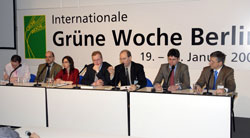 I can already tell from the remarks given so far that there’s still a lot of “traditional” thinking going on in the industry, including areas other than the U. S. By that I mean the whole issue of separating journalism and public relations. Todays new media mechanisms are blurring the lines in my opinion. When every person out there who has a camera, computer and internet connection can post instantaneous online information and when that includes the corporations themselves I’m not sure where you’re going to draw the line. The traditionalists seem to very easily dismiss new media outlets but they do so while their audiences decline and move on to those new media outlets. That’s why I evangelize the use of information platforms like blogging and podcasting.
I can already tell from the remarks given so far that there’s still a lot of “traditional” thinking going on in the industry, including areas other than the U. S. By that I mean the whole issue of separating journalism and public relations. Todays new media mechanisms are blurring the lines in my opinion. When every person out there who has a camera, computer and internet connection can post instantaneous online information and when that includes the corporations themselves I’m not sure where you’re going to draw the line. The traditionalists seem to very easily dismiss new media outlets but they do so while their audiences decline and move on to those new media outlets. That’s why I evangelize the use of information platforms like blogging and podcasting.
I also heard someone comment on the desire to have more agricultural news coverage in the non-farm press. Well I’m not sure how you’re going to accomplish that. I think a lot of people have been trying for a long time. The reality is that there are fewer ag journalists and more and more non-ag journalists. Why should they report on agriculture? Well one way would be if agricultural companies buy advertising in their media outlets right? Maybe.
I’ve also already heard the phrase, “One of the things that annoys me is . . . ” An example is the fact that many journalists just publish press releases without writing on their own. Is it ethical was the question that was asked. Well, is it? I guess I don’t worry about journalists who do that. Who cares? If what they write is boring they won’t have a significant audience will they? I worry more about my own content and my own audience. It’s sure not against the law to publish a press release is it? I hope it never is.
Post Update: I got to make a comment and throw out the whole idea of blogging and podcasting and how companies can now communicate directly with their customers. They wanted a lively debate here and I think I just helped jump start it. I find it interesting from the follow up responses to my comment that so many people think that when it comes to new media it’s an either/or situation. I never suggest that a magazine or broadcast isn’t important. I never say radio or magazines are dead. I do always try to point out that the consumer/customer now has ever more choices of where to get information and that includes company and consumer generated content. I know farmers who when they plan to buy a six-figure piece of equipment for their farm will check on the traditional media sources but they’ll also Google around for information from their peers and from the companies who make the equipment themselves. I also heard the idea presented that not all farmers go online to search blogs, etc. I say, of course. But how many of them read every page of every magazine they get? How many listen every day to every minute of every farm broadcast? Why wouldn’t you want to make your corporate message available in every way your customer may want it? That might include blogs and podcasts today! It might include Flickr and YouTube. And if you’re a journalist why aren’t you learning more about new media and making sure you have your voice heard there too?
I love these kinds of forums and wish we could have more of them in agricultural communications.

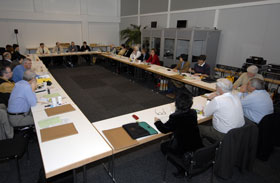 Here’s the whole group gathered together at the Green Week press center meeting about the very important things facing the IFAJ. We’ve got committee reports going on right now. Mike Wilson is discussing the communications committee. One of the things the organization is looking into is a change in the IFAJ website to make it easier to post current information and perhaps have more people involved in doing that. You can be sure that I’ve voiced my ideas on this issue!
Here’s the whole group gathered together at the Green Week press center meeting about the very important things facing the IFAJ. We’ve got committee reports going on right now. Mike Wilson is discussing the communications committee. One of the things the organization is looking into is a change in the IFAJ website to make it easier to post current information and perhaps have more people involved in doing that. You can be sure that I’ve voiced my ideas on this issue!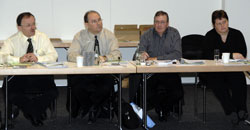 Here’s the head shed (leaders for those of you in Rio Lindo) of the
Here’s the head shed (leaders for those of you in Rio Lindo) of the 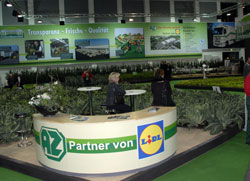 Some of the best looking vegetables I’ve ever seen are growing indoors here in one of the main agriculture buildings. I wish my garden looked like this. But I guess it would if I had a guy in overalls (there were a lot them) manually grooming and treating each plant every day. This building looks like a collaboration of many companies and you could essentially follow agricultural production through the whole chain from field to plate since you had crops, animals, processing and even a small grocery store set up to show how the consumer where their food actually comes from.
Some of the best looking vegetables I’ve ever seen are growing indoors here in one of the main agriculture buildings. I wish my garden looked like this. But I guess it would if I had a guy in overalls (there were a lot them) manually grooming and treating each plant every day. This building looks like a collaboration of many companies and you could essentially follow agricultural production through the whole chain from field to plate since you had crops, animals, processing and even a small grocery store set up to show how the consumer where their food actually comes from.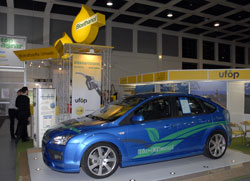 I had heard that Green Week had a whole pavilion devoted to bio energy this year. When I got there I found that it had more booths dedicated to things like wood pellet burning stoves for heat and a number of solar panel energy companies than what we think of such as ethanol and biodiesel.
I had heard that Green Week had a whole pavilion devoted to bio energy this year. When I got there I found that it had more booths dedicated to things like wood pellet burning stoves for heat and a number of solar panel energy companies than what we think of such as ethanol and biodiesel.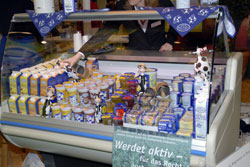 On Thursday at Green Week I finally had a chance to wander around some of the pavilions and booths. I started with the agricultural area first and walked right into a biobased products section. I’m not sure what the exact definition of “bio” is around the world or if it actually is different in different countries. I say this because this display was of organic dairy products and that doesn’t fit into my definition of bio-based products. In fact, I would say that true organic production implies to me that bio-type products weren’t used in the making of these items.
On Thursday at Green Week I finally had a chance to wander around some of the pavilions and booths. I started with the agricultural area first and walked right into a biobased products section. I’m not sure what the exact definition of “bio” is around the world or if it actually is different in different countries. I say this because this display was of organic dairy products and that doesn’t fit into my definition of bio-based products. In fact, I would say that true organic production implies to me that bio-type products weren’t used in the making of these items. It looks like there’s a new player in the farm policy game. The
It looks like there’s a new player in the farm policy game. The 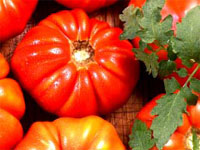 You might
You might 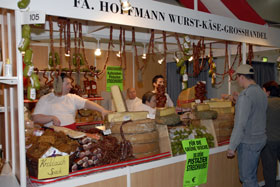 If you’re interested in acres of food booths then Green Week is the place to be. It’s really hard to convey how large this show is. This booth is just a representative sample of what you’ll find here.
If you’re interested in acres of food booths then Green Week is the place to be. It’s really hard to convey how large this show is. This booth is just a representative sample of what you’ll find here. 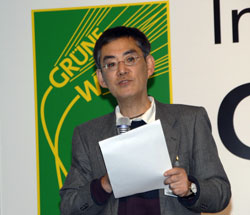 Right after our sushi lunch which did include some of the best sake I’ve ever tasted (really didn’t think I liked sake until now) I got to interview Yamada Masaru who is one of the main organizers for the
Right after our sushi lunch which did include some of the best sake I’ve ever tasted (really didn’t think I liked sake until now) I got to interview Yamada Masaru who is one of the main organizers for the